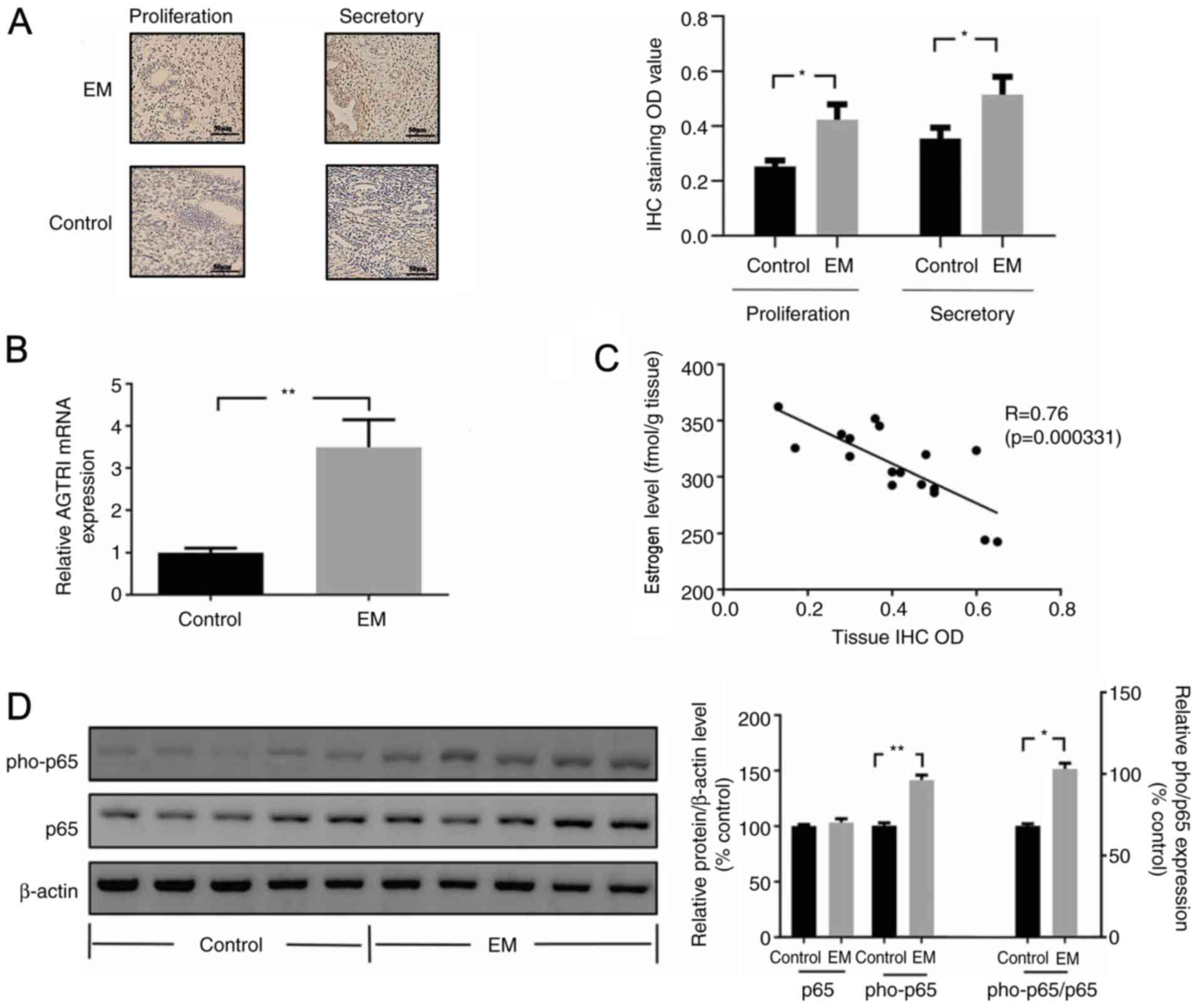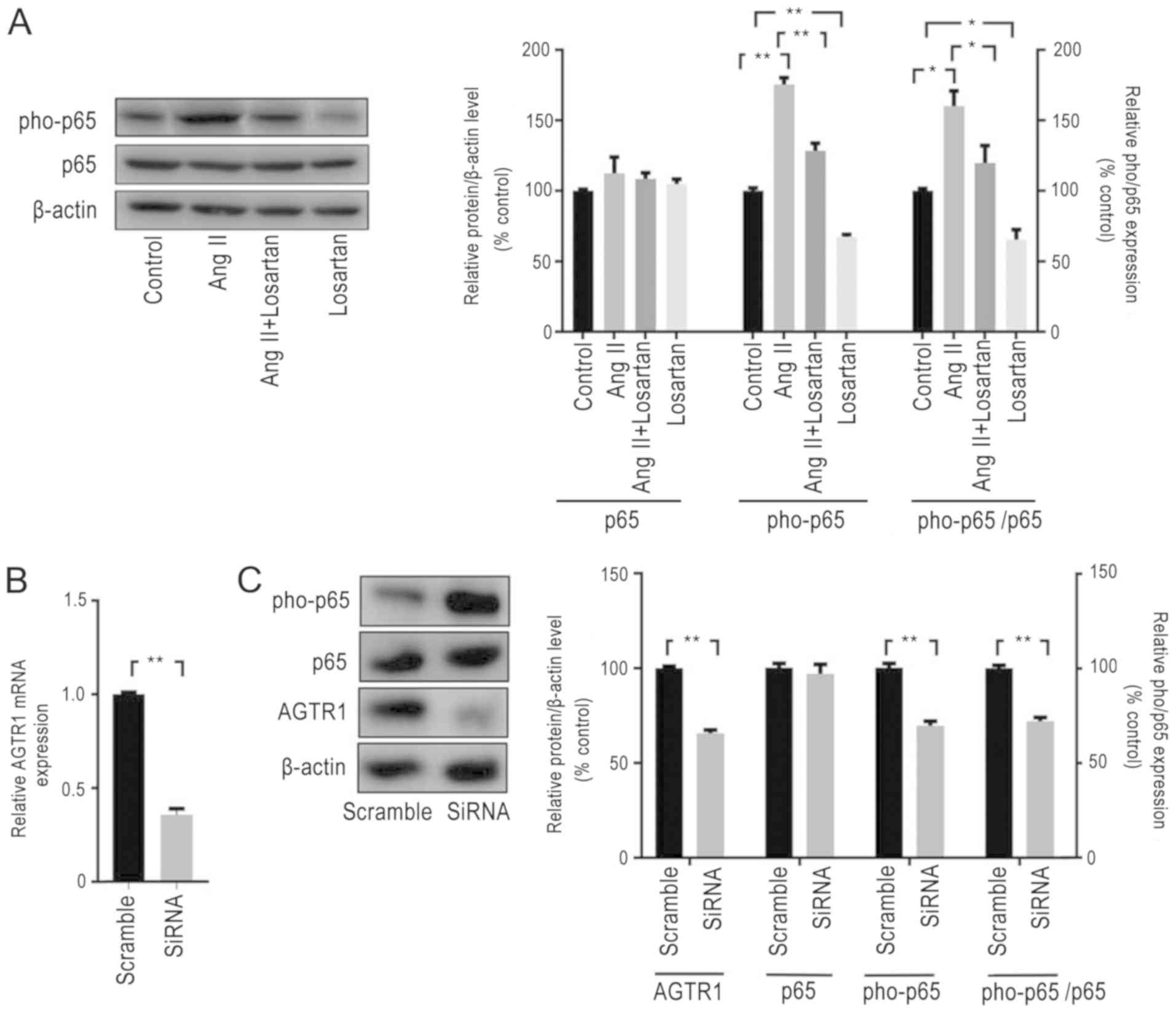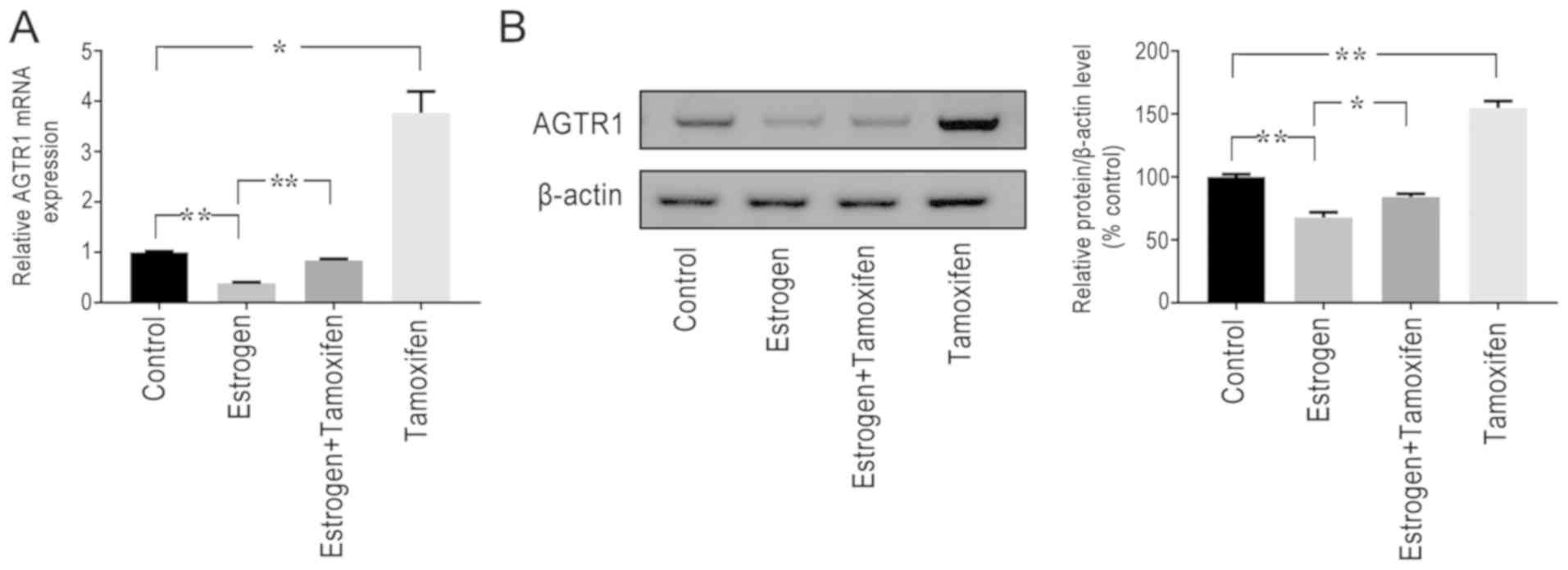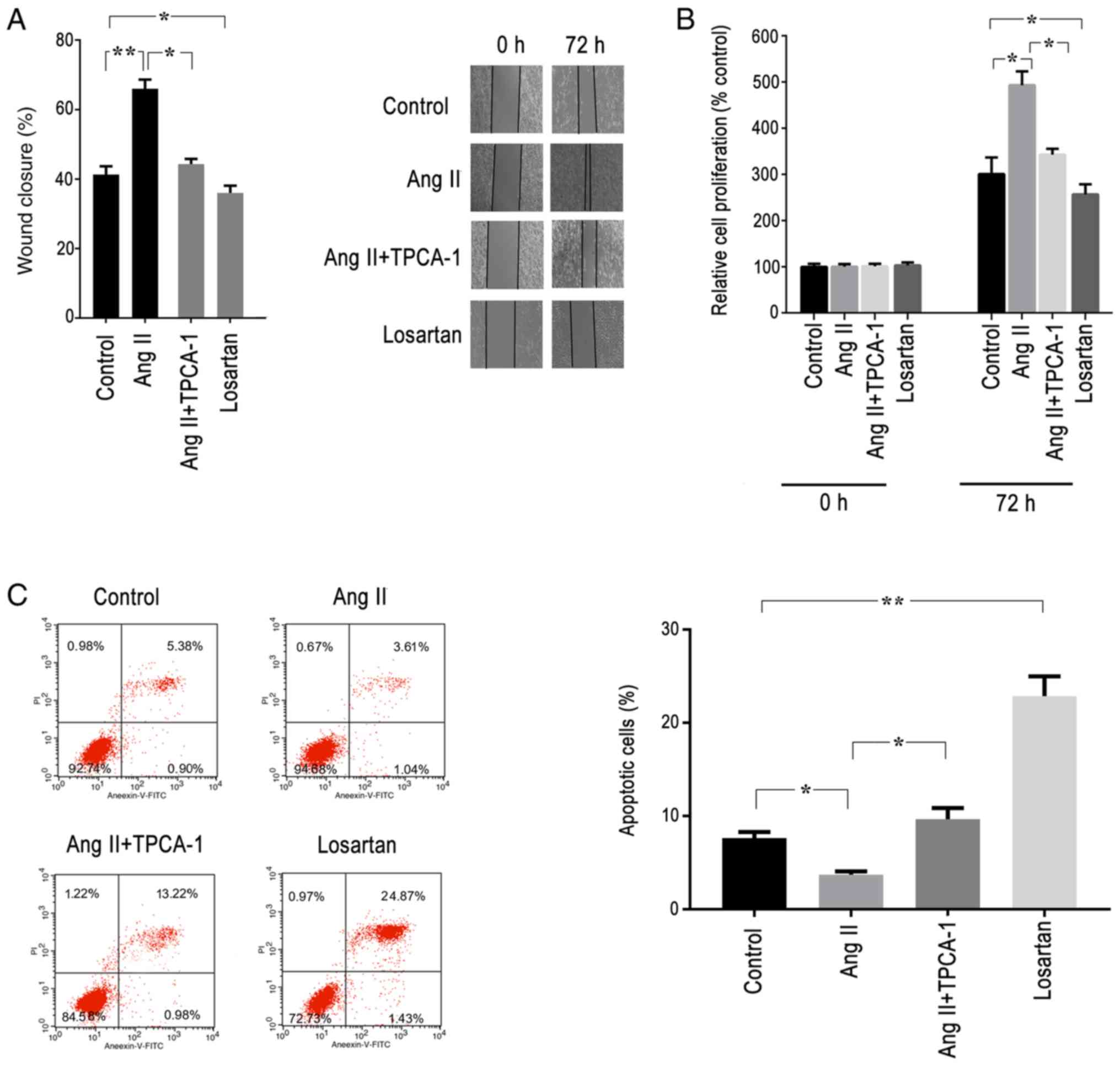|
1
|
Czyzyk A, Podfigurna A, Szeliga A and
Meczekalski B: Update on endometriosis pathogenesis. Minerva
Ginecol. 69:447–461. 2017.PubMed/NCBI View Article : Google Scholar
|
|
2
|
Cramer DW and Missmer SA: The epidemiology
of endometriosis. Ann N Y Acad Sci. 955:11–22, Discussion 34-16,
396-406. 2002.PubMed/NCBI View Article : Google Scholar
|
|
3
|
Garcia-Velasco JA and Somigliana E:
Management of endometriomas in women requiring IVF: To touch or not
to touch. Hum Reprod. 24:496–501. 2009.PubMed/NCBI View Article : Google Scholar
|
|
4
|
Diao R, Wei W, Zhao J, Tian F, Cai X and
Duan YG: CCL19/CCR7 contributes to the pathogenesis of
endometriosis via PI3K/Akt pathway by regulating the proliferation
and invasion of ESCs. Am J Reprod Immunol. 7(e12744)2017.PubMed/NCBI View Article : Google Scholar
|
|
5
|
Pazhohan A, Amidi F, Akbari-Asbagh F,
Seyedrezazadeh E, Farzadi L, Khodarahmin M, Mehdinejadiani S and
Sobhani A: The Wnt/β-catenin signaling in endometriosis, the
expression of total and active forms of β-catenin, total and
inactive forms of glycogen synthase kinase-3β, WNT7a and
DICKKOPF-1. Eur J Obstet Gynecol Reprod Biol. 220:1–5.
2017.PubMed/NCBI View Article : Google Scholar
|
|
6
|
Zhang Z, Ruan L, Lu M and Yao X: Analysis
of key candidate genes and pathways of endometriosis
pathophysiology by a genomics-bioinformatics approach. Gynecol
Endocrinol. 35:576–581. 2019.PubMed/NCBI View Article : Google Scholar
|
|
7
|
Park YA, Choi CH, Do IG, Song SY, Lee JK,
Cho YJ, Choi JJ, Jeon HK, Ryu JY, Lee YY, et al: Dual targeting of
angiotensin receptors (AGTR1 and AGTR2) in epithelial ovarian
carcinoma. Gynecol Oncol. 135:108–117. 2014.PubMed/NCBI View Article : Google Scholar
|
|
8
|
Watanabe Y, Shibata K, Kikkawa F, Kajiyama
H, Ino K, Hattori A, Tsujimoto M and Mizutani S: Adipocyte-derived
leucine aminopeptidase suppresses angiogenesis in human endometrial
carcinoma via renin-angiotensin system. Clin Cancer Res.
9:6497–6503. 2003.PubMed/NCBI
|
|
9
|
Hsieh YY, Chang CC, Chen SY, Chen CP, Lin
WH and Tsai FJ: XRCC1 399 Arg-related genotype and allele, but not
XRCC1 His107Arg, XRCC1 Trp194Arg, KCNQ2, AT1R, and hOGG1
polymorphisms, are associated with higher susceptibility of
endometriosis. Gynecol Endocrinol. 28:305–309. 2012.PubMed/NCBI View Article : Google Scholar
|
|
10
|
MacKenzie A: Endothelium-derived
vasoactive agents, AT1 receptors and inflammation. Pharmacol Ther.
131:187–203. 2011.PubMed/NCBI View Article : Google Scholar
|
|
11
|
Wei X and Shao X: Nobiletin alleviates
endometriosis via down-regulating NF-κB activity in endometriosis
mouse model. Biosci Rep. 38(BSR20180470)2018.PubMed/NCBI View Article : Google Scholar
|
|
12
|
Taniguchi F, Uegaki T, Nakamura K, Mon KY,
Harada T and Ohbayashi T: Inhibition of IAP (inhibitor of
apoptosis) proteins represses inflammatory status via nuclear
factor-kappa B pathway in murine endometriosis lesions. Am J Reprod
Immunol. 79:2018.PubMed/NCBI View Article : Google Scholar
|
|
13
|
Diop-Frimpong B, Chauhan VP, Krane S,
Boucher Y and Jain RK: Losartan inhibits collagen I synthesis and
improves the distribution and efficacy of nanotherapeutics in
tumors. Proc Natl Acad Sci USA. 108:2909–2914. 2011.PubMed/NCBI View Article : Google Scholar
|
|
14
|
Block M, Fister S, Emons G, Seeber S,
Gründker C and Günthert AR: Antiproliferative effects of
antiestrogens and inhibitors of growth factor receptor signaling on
endometrial cancer cells. Anticancer Res. 30:2025–2031.
2010.PubMed/NCBI
|
|
15
|
Slopien R and Meczekalski B: Aromatase
inhibitors in the treatment of endometriosis. Prz Menopauzalny.
15:43–47. 2016.PubMed/NCBI View Article : Google Scholar
|
|
16
|
Polin SA and Ascher SM: The effect of
tamoxifen on the genital tract. Cancer Imaging. 8:135–145.
2008.PubMed/NCBI View Article : Google Scholar
|
|
17
|
Podolin PL, Callahan JF, Bolognese BJ, Li
YH, Carlson K, Davis TG, Mellor GW, Evans C and Roshak AK:
Attenuation of murine collagen-induced arthritis by a novel,
potent, selective small molecule inhibitor of IkappaB Kinase 2,
TPCA-1
(2-[(aminocarbonyl)amino]-5-(4-fluorophenyl)-3-thiophenecarboxamide),
occurs via reduction of proinflammatory cytokines and
antigen-induced T cell Proliferation. J Pharmacol Exp Ther.
312:373–381. 2005.PubMed/NCBI View Article : Google Scholar
|
|
18
|
Chatterjee S, Malhotra R, Varghese F,
Bukhari AB, Patil A, Budrukkar A, Parmar V, Gupta S and De A:
Quantitative immunohistochemical analysis reveals association
between sodium iodide symporter and estrogen receptor expression in
breast cancer. PLoS One. 8(e54055)2013.PubMed/NCBI View Article : Google Scholar
|
|
19
|
Livak KJ and Schmittgen TD: Analysis of
relative gene expression data using real-time quantitative PCR and
the 2(-Delta Delta C(T)) method. Methods. 25:402–408.
2001.PubMed/NCBI View Article : Google Scholar
|
|
20
|
Reis FM, Petraglia F and Taylor RN:
Endometriosis: Hormone regulation and clinical consequences of
chemotaxis and apoptosis. Hum Reprod Update. 19:406–418.
2013.PubMed/NCBI View Article : Google Scholar
|
|
21
|
Nehme A, Zouein FA, Zayeri ZD and Zibara
K: An update on the tissue renin angiotensin system and its role in
physiology and pathology. J Cardiovasc Dev Dis.
6(14)2019.PubMed/NCBI View Article : Google Scholar
|
|
22
|
Herr D, Bekes I and Wulff C: Local
renin-angiotensin system in the reproductive system. Front
Endocrinol (Lausanne). 4(150)2013.PubMed/NCBI View Article : Google Scholar
|
|
23
|
Vinson GP, Teja R, Ho MM, Hinson JP and
Puddefoot JR: The role of the tissue renin-angiotensin system in
the response of the rat adrenal to exogenous angiotensin II. J
Endocrinol. 158:153–159. 1998.PubMed/NCBI View Article : Google Scholar
|
|
24
|
Yoshimura Y: The ovarian renin-angiotensin
system in reproductive physiology. Front Neuroendocrinol.
18:247–291. 1997.PubMed/NCBI View Article : Google Scholar
|
|
25
|
Brunswig-Spickenheier B and Mukhopadhyay
AK: Local regulatory factors in regulation of ovarian function:
Role of prorenin-renin-angiotensin-system. Indian J Exp Biol.
41:669–681. 2003.PubMed/NCBI
|
|
26
|
Abraham F, Sacerdoti F, De Leon R, Gentile
T and Canellada A: Angiotensin II activates the calcineurin/NFAT
signaling pathway and induces cyclooxygenase-2 expression in rat
endometrial stromal cells. PLoS One. 7(e37750)2012.PubMed/NCBI View Article : Google Scholar
|
|
27
|
Kowalczyńska LJ, Ferenc T, Wojciechowski
M, Mordalska A, Pogoda K and Malinowski A: Endometriosis and RAS
system gene polymorphisms: The association of ACE A2350G
polymorphism with endometriosis in Polish individuals. DNA Cell
Biol. 33:328–335. 2014.PubMed/NCBI View Article : Google Scholar
|
|
28
|
Nakao T, Chishima F, Sugitani M, Tsujimura
R, Hayashi C and Yamamoto T: Expression of angiotensin II types 1
and 2 receptors in endometriotic lesions. Gynecol Obstet Invest.
82:294–302. 2017.PubMed/NCBI View Article : Google Scholar
|
|
29
|
King AE, Critchley HO and Kelly RW: The
NF-kappaB pathway in human endometrium and first trimester decidua.
Mol Hum Reprod. 7:175–183. 2001.PubMed/NCBI View Article : Google Scholar
|
|
30
|
Kaponis A, Iwabe T, Taniguchi F, Ito M,
Deura I, Decavalas G, Terakawa N and Harada T: The role of
NF-kappaB in endometriosis. Front Biosci (Schol Ed). 4:1213–1234.
2012.PubMed/NCBI View
Article : Google Scholar
|
|
31
|
Luca M, Huang S, Gershenwald JE, Singh RK,
Reich R and Bar-Eli M: Expression of interleukin-8 by human
melanoma cells up-regulates MMP-2 activity and increases tumor
growth and metastasis. Am J Pathol. 151:1105–1113. 1997.PubMed/NCBI
|
|
32
|
Nie J, Lu Y, Liu X and Guo SW:
Immunoreactivity of progesterone receptor isoform B, nuclear factor
kappaB, and IkappaBalpha in adenomyosis. Fertil Steril. 92:886–889.
2009.PubMed/NCBI View Article : Google Scholar
|
|
33
|
Park H, Kim SH, Cho YM, Ihm HJ, Oh YS,
Hong SH, Chae HD, Kim CH and Kang BM: Increased expression of
nuclear factor kappa-B p65 subunit in adenomyosis. Obstet Gynecol
Sci. 59:123–129. 2016.PubMed/NCBI View Article : Google Scholar
|
|
34
|
Li X, Zhang YJ, Meng Y, Zhou GS and Zhang
ZS: Effect of angiotensin II type 1 receptor and
angiotensin-converting enzyme gene silencing on nuclear
factor-kappaB activity in hepatic stellate cells. Nan Fang Yi Ke Da
Xue Xue Bao. 29:402–404. 2009.(In Chinese). PubMed/NCBI
|
|
35
|
Du N, Feng J, Hu LJ, Sun X, Sun HB, Zhao
Y, Yang YP and Ren H: Angiotensin II receptor type 1 blockers
suppress the cell proliferation effects of angiotensin II in breast
cancer cells by inhibiting AT1R signaling. Oncol Rep. 27:1893–1903.
2012.PubMed/NCBI View Article : Google Scholar
|
|
36
|
Ekambaram P, Lee JL, Hubel NE, Hu D,
Yerneni S, Campbell PG, Pollock N, Klei LR, Concel VJ, Delekta PC,
et al: The CARMA3-Bcl10-MALT1 signalosome drives NFκB activation
and promotes aggressiveness in angiotensin II receptor-positive
breast cancer. Cancer Res. 78:1225–1240. 2018.PubMed/NCBI View Article : Google Scholar
|
|
37
|
Jia G, Stormont RM, Gangahar DM and
Agrawal DK: Role of matrix Gla protein in angiotensin II-induced
exacerbation of vascular calcification. Am J Physiol Heart Circ
Physiol. 303:H523–H532. 2012.PubMed/NCBI View Article : Google Scholar
|
|
38
|
Galvankar M, Singh N and Modi D: Estrogen
is essential but not sufficient to induce endometriosis. J Biosci.
42:251–263. 2017.PubMed/NCBI View Article : Google Scholar
|
|
39
|
Wang X, Mamillapalli R, Mutlu L, Du H and
Taylor HS: Chemoattraction of bone marrow-derived stem cells
towards human endometrial stromal cells is mediated by estradiol
regulated CXCL12 and CXCR4 expression. Stem Cell Res. 15:14–22.
2015.PubMed/NCBI View Article : Google Scholar
|
|
40
|
Dotan I, Werner L, Vigodman S, Weiss S,
Brazowski E, Maharshak N, Chen O, Tulchinsky H, Halpern Z and
Guzner-Gur H: CXCL12 is a constitutive and inflammatory chemokine
in the intestinal immune system. Inflamm Bowel Dis. 16:583–592.
2010.PubMed/NCBI View Article : Google Scholar
|
|
41
|
Cunha-Filho JS, Gross JL, Bastos de Souza
CA, Lemos NA, Giugliani C, Freitas F and Passos EP:
Physiopathological aspects of corpus luteum defect in infertile
patients with mild/minimal endometriosis. J Assist Reprod Genet.
20:117–121. 2003.PubMed/NCBI View Article : Google Scholar
|
|
42
|
Smith MP, Keay SD, Margo FC, Harlow CR,
Wood PJ, Cahill DJ and Hull MG: Total cortisol levels are reduced
in the periovulatory follicle of infertile women with minimal-mild
endometriosis. Am J Reprod Immunol. 47:52–56. 2002.PubMed/NCBI View Article : Google Scholar
|
|
43
|
Kooptiwut S, Wanchai K, Semprasert N,
Srisawat C and Yenchitsomanus PT: Estrogen attenuates AGTR1
expression to reduce pancreatic β-cell death from high glucose. Sci
Rep. 7(16639)2017.PubMed/NCBI View Article : Google Scholar
|
|
44
|
Gao H, Yallampalli U and Yallampalli C:
Protein restriction to pregnant rats increases the plasma levels of
angiotensin II and expression of angiotensin II receptors in
uterine arteries. Biol Reprod. 86(68)2012.PubMed/NCBI View Article : Google Scholar
|
|
45
|
Nickenig G, Baumer AT, Grohe C, Bäumer AT,
Grohè C, Kahlert S, Strehlow K, Rosenkranz S, Stäblein A, Beckers
F, et al: Estrogen modulates AT1 receptor gene expression in vitro
and in vivo. Circulation. 97:2197–2201. 1998.PubMed/NCBI View Article : Google Scholar
|
|
46
|
Xue Q, Xiao D and Zhang L: Estrogen
regulates angiotensin II receptor expression patterns and protects
the heart from ischemic injury in female rats. Biol Reprod.
93(6)2015.PubMed/NCBI View Article : Google Scholar
|


















